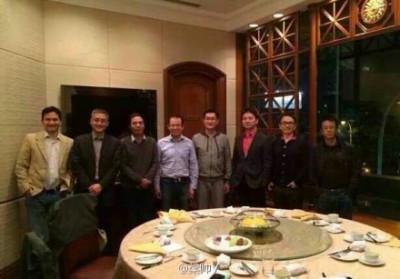Tencent, Asia’s largest Internet company, is poised to buy a 16-percent stake in China’s leading online retailer JD.com, according to Chinese media reports, a big move in China’s e-commerce market. The official announcement is expected next week.
The move is widely viewed as a strategic collaboration to shore up the two parties against their common competitor Alibaba, China’s largest e-commerce company.
Tencent is best known for its WeChat messaging service, which has more than 272 million monthly active users, mainly in China. It had appointed Barclays bank to advise it on a potential purchase of JD.com shares, the Wall Street Journal reported last month.
The company could merge its less popular e-commerce services Buy.qq.com and Yixun.com with JD.com, China’s second-largest online retailer, in return for the latter’s stock. JD.com would benefit from Tencent’s huge social network traffic, especially through WeChat, to help it compete with Alibaba. JD.com’s founder Richard Liu would still hold over half of the voting rights.

Tencent and JD's CEOs (Photo from Sina Weibo)
JD.com is currently preparing for a 1.5 billion dollar U.S. listing, ahead of a much anticipated listing by bigger rival Alibaba Group Holding.
An operational tie-up between Tencent and JD.com could create a strong competitor to Alibaba, which has thus far dominated China's e-commerce market.
JD.com’s presence in e-commerce is small compared with rival Alibaba, but an alliance with Tencent could create a bigger player. JD.com, like Amazon.com, is a direct seller of goods, while Alibaba runs eBay-like online marketplaces where many merchants sell items directly to customers. Analysts say Tencent could turn WeChat's vast user base into a platform for offering other services such as mobile shopping, and a partnership with JD.com could provide Tencent with more resources in running e-commerce operations.
JD.com wants to take advantage of Tencent’s overwhelming online presence, especially in the mobile area, while Tencent wants to put its online payment system into better use by working together with JD.com’s well-established e-commerce sector.
Tencent could sell its e-commerce assets, tiny compared to JD.com, at a good price and focus on core business of social networking and promising financial business.
An e-commerce consulting company CEO “Lu Zhengwang” was optimistic about the deal:
鲁振旺:腾讯将拍拍+易迅网打包给京东,自己为微信也建立了最具有支撑点的网购支付入口,未来微信搞移动网购平台的希望就更大了一些,微信支付开放之后,会形成移动网购小生态,跟手机淘宝竞争,有了腾讯入股,京东重新IPO,腰板更硬,又有了腾讯在PC和移动端的流量资源,拍拍+京东对抗淘宝+天猫
After packaging Paipai.com and Yixun.com to JD.com and building a solid online shopping payment entry, WeChat would have more opportunities to construct mobile shopping platform. A small mobile shopping ecosystem would pop up after WeChat payments are opened, stepping up competition with Taobao mobile. JD.com would be more confident in its coming IPO with Tencent’s investment and traffic resources from PC and mobile devices. The situation will become that Paipai.com + JD.com versus Taobao + Tmall
A netizen “About Yao Zhonglin” said the potential merge signaled that China’s Internet is entering into an oligopoly:
关于姚忠林:更有意思的是互联网企业都几乎开始被两个巨头频繁接触,洽谈入股或收购的可能,互联网圈开始了“站队”游戏。连京东、360这样的小巨头都开始被传言分别将被腾讯和阿里入股。几乎所有市场上有一定价值的互联网企业,都会被问到一个问题,如何选择站队?这标志着,中国互联网,正在进入双寡头时代
What’s more interesting is that two giants are starting to contact nearly all Internet companies, negotiate about potential investments or acquisitions. China’s Internet industry has started a ‘take sides’ game. Even such small companies like JD.com and 360 have been reported to receive investments from Tencent and Alibaba respectively. Nearly all valuable Internet firms will be asked to choose a side. It signals that China’s Internet is headed toward twin oligopolies.
Chinese netizens responded on tech social media Huxiu.com with a variety of opinions to the report of Tencent and JD.com’s potential collaboration:
漂过沙漠:只有腾讯把自己的电商基因阉割给京东,刘强东才会嫁给腾讯。估计这两件事情都会发生。没有腾讯京东必然沦为众多服务员中的一个;没有京东这样的电商巨头,腾讯的电商始终小打小闹,对腾讯来讲移动互联网时代,时间比金钱更宝贵。消息已经传到这个程度上,是否把易迅打包给京东只是谈判桌上的一些小把戏,大局已定。
“Floating over desert”: Richard Liu would “marry” Tencent only after Tencent sent its e-commerce sector to JD.com. This is likely to happen. JD.com would end up just one of many sites without Tencent; Tencent’s e-commerce sector would be unable to achieve bigger success without an e-commerce giant like JD.com. For Tencent, time is worth more than money in the mobile Internet era. It’s likely that the situation has settled, whether to transfer Yixun to JD.com would just be a chip on negotiating table.
113478127: 我并不希望腾讯入股成功,对普通消费者或我们站长来说,他们越分散,竞争越大,对我们来说越有利,如果只剩一两个寡头时我们就惨了。
I don’t want Tencent to buy a stake in JD.com. For us common consumers, the more e-commerce companies there are, the fiercer the competitions becomes, the more benefits we’ll gain. We’re going to lose if there is just oligopoly in market.
嬉笑怒骂才能活:腾讯越来越像投资银行了,可能它越来越明白电商自己很难做大,这个时机卖出最好,不如把精力集中在核心业务社交网络和未来的互联网金融上,What'sApp就是明证,既轻又值钱。所以它的视频可能也要卖。对于京东来说,易迅价值不大,但可能是个好Story,在上市时增加估值,另外能换来腾讯的社交网络流量。
Laughing and cursing to survive: Tencent has become more like an investment bank. It may have realized that its own e-commerce business would hardly grow into a giant, so now is the time to sell. It could focus on core businesses like social networking and promising Internet finance. Facebook’s acquisition of WhatsApp has proven the potential value of social networking. Along this trend, Tencent could sell its flat video sector. Tencent’s e-commerce sector like Yixun.com seems not very valuable for JD.com, but may improve JD’s listing story and add to its valuation. The merger could also help JD get Tencent’s social network traffic.






